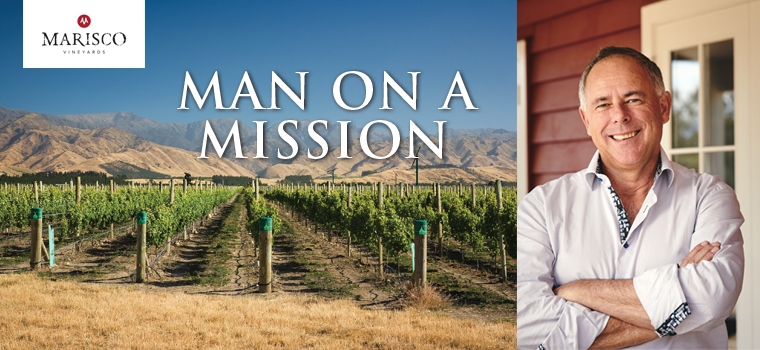Marisco Vineyard’s winemaker and owner Brent Marris seeks to combine wine, farming and family.
"Marris has a clear idea of where Marisco Vineyard’s core focus is and prefers to keep improving upon this rather than seek change for its own sake, stating that he is not interested in Marisco Vineyards trying to be all things to all people."
EMMA JENKINS
“HAVE I told you about our Angus bull sale?” Brent Marris is certainly the first winemaker I’ve interviewed to open with a line like that, leaving me momentarily nonplussed. I should have known better, having twice previously profiled Marris’s company Marisco Vineyards, for he is a man on a mission, marrying family, wine and farming in a farsighted manner.
The bulls in question are the Angus cattle born and bred on Leefield Station, the historic 2200ha sheep and beef farm acquired by the Marris family in 2013. Ten years previously, Marris and wife Rosemary established a 260ha vineyard and winery in Marlborough’s Waihopai Valley, launching The Ned and The King’s Series brands in 2006. It was soon clear more fruit was required – current estimate is that every 24 hours some 35,000 bottles of just The Ned brand are consumed globally. The purchase of Leefield Station ensured more prime viticultural land just a little further up the valley from the existing vineyard and winery and importantly, allowed a marked expansion of the Marisco Vineyards vision.
Over the past ten years Marris and his team have mapped the station via 100 soil pits and planted 600ha of vines, matching varieties to the soil type. A winery was built in time for the 2020 harvest and the Leefield Station and The Craft Series brands developed. The farm’s original 100-year-old woolshed has been meticulously restored, and the past few years have seen the development of ‘The Village’, a collection of communal buildings reminiscent of a traditional farm hub, including a dining hall and village green. Leefield Station remains a working farm, registered as an Angus cattle breeder, running Romney and Hampshire sheep and Berkshire pigs on its hillsides, while grapes occupy the flatlands. Fencing, shelter plantings, water and feed supplies have been improved, and they have established a huge dam landscaped as a lake. All up, there is some 200ha of parkland and streams, 1000ha of stocked hillsides and 300ha of native bush – not only a sophisticated and sustainable farm ecosystem but also a unique wine tourism experience. Marris has brought Australian and UK buyers to sit by the stream and taste the Marisco Vineyards wines amongst its buildings and vines. He says there’s “never any need to do the hard sell” as the Marisco Vineyards ethos is there all around them. The Village has been used for community events such as Pony Club and Hound Shows, and of course, the bull sale took place on the village green, the animals calmly at home in the environment where they were raised. Marris says, “There was a lot of satisfaction and pride that day, seeing all the elements of Leefield Station come together as we as a family and company had planned”. He views the unique farm system as an integral aspect of Marisco Vineyard’s wines, commenting that their consumers “get more than just a slice of NZ wine, they also get integrity and authenticity, a unique expression of this land”.
Leefield Station’s whole system integration, owning their vineyards and wineries, and having dedicated teams is very important to Marris, the key to maintaining Marisco Vineyard’s control from the vineyard to finished wine which he says pays dividends in the wines’ consistent quality and style. Over 95% of Marisco Vineyard’s fruit comes from their vineyards, and they’re aiming for 100%. The two wineries allow fruit to be processed within an hour of picking, reducing impact from oxidation and phenolics, and contributing towards their fresh, fruit-focused styles. Marris says as the vines, and the vineyard and winery teams have matured, they’ve seen an increase in “site expression, balance, flavour – and confidence in ourselves.”
Marris has a clear idea of where Marisco Vineyard’s core focus is and prefers to keep improving upon this rather than seek change for its own sake, stating that he is not interested in Marisco Vineyards trying to be all things to all people. He is also not one for sitting still. With the vision for Leefield Station coming to fruition, the next steps are taking the company towards carbon negativity, examining all aspects of their environmental footprint for areas of improvement. A second stage of the Leefield Station winery has solar units incorporated into its building panels, all winery water and grape marc are returned to the property, there is an intensive recycling programme that turns plastic containers into vineyard posts, and of course, all food scraps make their way to the resident Berkshire pigs. They have established a native plant nursery, growing and planting 5,000 trees annually, and two recent ‘50-year floods’ have provided opportunity to futureproof flood management around the properties. Ongoing vine planting is focused on areas that may previously have been considered marginal but will help mitigate climate change impacts as well as diversify fruit expression.
This longer-term outlook extends to family. Of Brent and Rosemary Marris’s four daughters, the eldest Emma is a winemaker managing the Leefield Station winery, who has recently delved further into its business aspects working at a mergers and acquisition firm; Georgia is in sales and marketing, with a growing eye for international markets, and while the other two are finishing university, they too have a keen interest in Marisco Vineyards and its future plans.
Marris says the string of medals and trophies at local and international wine shows, accolades such as those achieved within this magazine and enviable sales data from both NZ, Australia and UK mean they feel confident Marisco Vineyards is on the right track. They have consistency in not only their production process but also in the branding and message they deliver to their consumers, which is about to be ramped up via a global ad campaign.
Marris is excited by what’s to come, outlining, “We’ve continued the journey of the station’s history, with the bulls, sheep, cattle, anchored it with the building to when it was first established over 100 years ago, and then brought modern Marlborough to it via the vineyards and a winery”. He says, “to dovetail both farming with viticulture and winemaking, and take that to the world… I think in 50 years’ time, this is going to become a very special place that is going to be seen internationally as a wonderful asset for Marlborough”.





